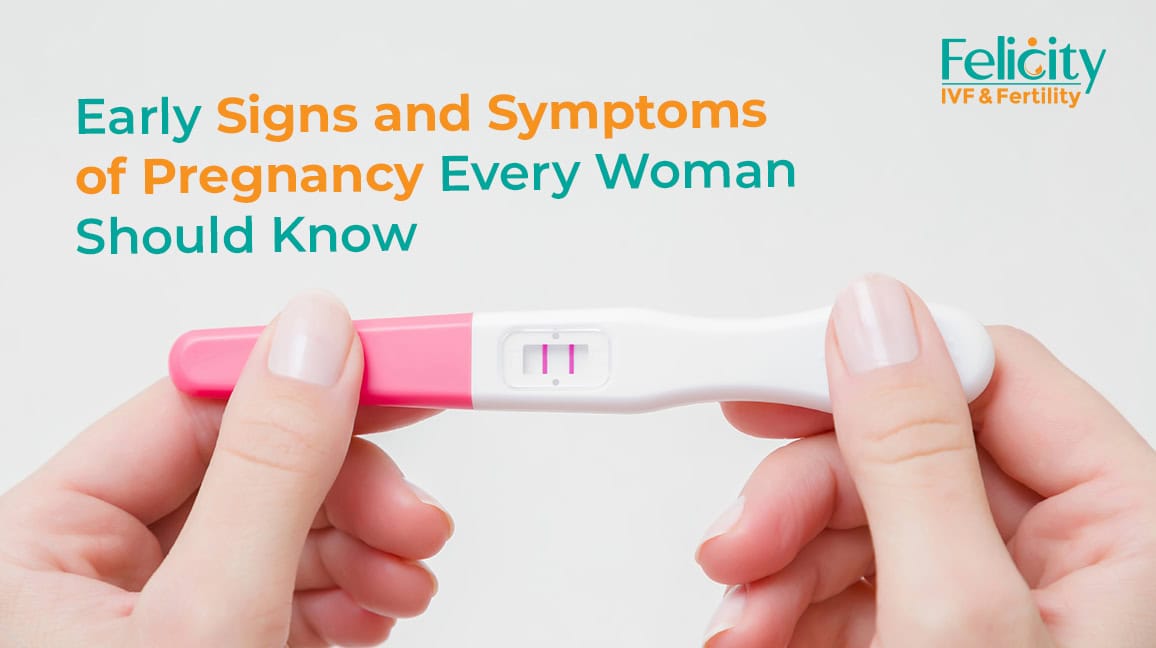Early Signs and Symptoms of Pregnancy Every Woman Should Know

The possibility of pregnancy is tinged with excitement, curiosity and questions for many women. Be it an active situation in which you are experiencing an attempt to get pregnant or a suspicion that something is already different, you need to understand early pregnancy signs. Most of these changes in your body would manifest themselves even before you get your period and can be taken as your body telling you it is time to take that pregnancy test via its gentle tap on the shoulder. Knowing these signs will enable you to be more ready, well knowledgeable and well equipped regarding what to do next.
Understanding Pregnancy and Its Early Signs
When a fertilised egg goes down into the uterine lining, the pregnancy begins. At this point, your body will be flooded with hormones that will induce a range of changes, some of which will be instantaneous, whereas others will take a bit longer. These hormonal changes are the key to these first symptoms of pregnancy, which may be different in each woman.
Whilst an individual may show practically every symptom, others could hardly pay attention to some signs. It is worthwhile to listen to your body and notice what is new or unusual in your practice.
Common Early Symptoms of Pregnancy Every Woman Should Recognise
You should not wait until you miss a period to be alert to the signs. The following are some of the early pregnancy signs, which can be experienced early in the pregnancy before the second week of conception:
- Gentle cramping and bleeding
- Having an abnormal tiredness
- Alterations in how you smell or taste things
- Breast tenderness
- Frequent urination
- Vomiting or nausea
Such symptoms are the process of your body adapting itself to the hormonal changes in pregnancy.
Pregnancy Fatigue: One of the First Symptoms of Pregnancy
Do you have a feeling of fatigue? The first and most popular early pregnancy signs include extreme fatigue.
- Proposed by the increased concentration of progesterone.
- The developing baby also results in your body generating increased blood.
- You may also feel sleepy or have a lack of energy, even after having a good sleep.
This pregnancy tiredness is common in the first trimester and normally gets resolved during the second.
Morning Sickness: The Nausea and Vomiting During The First Stages of Pregnancy
Morning sickness during pregnancy does not necessarily go away in the morning. Nausea can occur at any time of the day among many women.
- It usually starts during the 6th week of pregnancy.
- The increased levels of these hormones, especially those of hCG, trigger this reaction.
- May be followed by aversions against some smell or foodstuff.
Keeping well hydrated and taking small and frequent meals can contribute to the decrease of symptoms.
Changes in Your Body: Hormonal Shifts and Pregnancy Signs
Hormonal changes in pregnancy virtually shake every part of the body, starting with the head and ending with the toes. All these changes are crucial towards maintaining the pregnancy and getting the body ready to deliver; however, they come with physical changes which are evident.
Tender Breasts: Early Pregnancy Indicator
In case you have sore, heavy or swollen breasts, you are not alone.
- One of the first changes that could be noticed in pregnancy is tender breasts during pregnancy.
- These are caused by an elevated amount of oestrogen and progesterone.
- These are veins that can grow prominent, and nipples can become darker.
Use of a supportive bra can alleviate the uneasy feeling, particularly when one is asleep.
Spotting and Cramping: Is it Early Pregnancy or Period?
Other women usually misinterpret spotting in early pregnancy as the breaking of their period. The implantation bleeding is, however, lighter and shorter.
- It happens 6 to 12 days following ovulation.n
- Usually pink or brown
- May be accompanied by mild cramps
If you are unsure whether it is implantation bleeding or your period, tracking symptoms and timing can help.
The Role of Hormones in Pregnancy Symptoms
During early pregnancy, there is an increase in the level of hormones such as hCG, Oestrogen and progesterone. Most of the early pregnancy signs are due to these hormonal changes.
They are capable of influencing:
- Digestion (bloating or feeling of nausea)
- Emotional sensitivity (caused by mood)
- The rise of body temperature (resulting in a permanent magnification of basal body temperature)
These changes are essential, but they can become extreme, especially during the first trimester.
Increased Urination During Pregnancy: What Does This Mean?
Many trips to the loo can begin long before you realise you are late with your period.
- Oedema during pregnancy occurs due to hormonal alterations and the increased flow of blood to the kidneys, causing an increase in the rate of urination.
- The uterus also starts swelling, and the bladder is pressurised.
It is essential to drink water more often, even though it requires more trips to the bathroom.
Food Cravings and Food Aversions: What Do They Imply?
Numerous women claim to have uncontrollable cravings for certain foods or a sudden preference or hatred against other things.
- Sometimes food cravings during pregnancy are an indication of nutritional requirements or just hormonal changes.
- The desires may be sweet, salty, sour or strange food combinations.
- In the case of aversions, the foods are usually strong-smelling or spicy.
Attempt to eat healthy, but respect the safe cravings once in a while.
When to Take a Pregnancy Test: Understanding the Right Time
A test can save you time, anxiety when you know how and when to have them. The pregnancy tests can be used to detect the hCG in your urine; it is a hormone that accumulates after implantation.
Optimal time of testing:
- After a missed period for the most reliable results
- Some early tests claim accuracy up to 6 days before your period, but false negatives are more likely.
If your test is negative but symptoms persist, wait a few days and test again.
Felicity: How to Prepare for Your Pregnancy Journey
One of the important factors in taking care of your reproductive health is being able to identify the early pregnancy signs. These are among the pointers, though not all at once and may not be glaring so that your body is gearing up to change radically. Whether it is pregnancy fatigue, morning sickness, pregnancy spotting or food craving during pregnancy, every symptom has something to say.
When you suspect that you might be pregnant, seek an expert opinion to find out as well as receive the right advice. We at Felicity IVF and Fertility Center realise that not everyone gets to the journey to motherhood in the same way. Through our understanding, specialist support, you can find guidance even in the most initial stages of life.
Looking to find reassurance, fertility help or even what to do next, Felicity IVF clinic is here to guide you.
FAQs
Early pregnancy signs like fatigue, tender breasts, spotting, or nausea may appear 6–12 days post-ovulation due to hormonal changes in pregnancy.
For reliable results, test after a missed period. First symptoms of pregnancy, like morning sickness or increased urination, may appear earlier, but confirm with a test.
Watch for early signs like pregnancy fatigue, spotting in early pregnancy, tender breasts, food cravings, or morning sickness during pregnancy caused by hormonal shifts.
